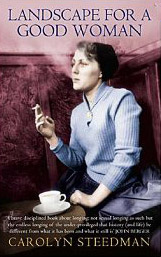This book challenges what has previously been written about the working class in this country. The descriptions that have been oversimplified, putting people and their families from that background into a lumpen mass assuming the psychological sameness of all, and interpreted mainly by people who are not working class. In fact, class consciousness has often not been perceived as psychological consciousness.
The autobiographical story is told through the memories of the author’s childhood during the nineteen-fifties, her relationship with her parents, particularly with her mother, and how her mother’s story is inexorably linked with hers. The mother, who has migrated to South London from a Lancashire mill town, came from a traditional Labour background but was very much a working class Tory. As a child the stories from her earlier Lancashire family history shaped her understanding of the ‘terrible unfairness of things’ and ‘culture of longing for that which one can never have’.
The author describes her mother’s attitudes towards lack of money, cleanliness, clean living, what a good mother should be etc., and what really touches the heart, is how her mother wanted to dress in the ‘New Look’ style of the time but could not afford to.
The child not only recognises the desires of the mother but also the social class system of the time in relation to the parent and how this results in ‘meaning for their children is altered and restrained by the position they occupy in a class society’.
This book will certainly be of interest to anyone who would like to know more about working class history and will have a definite impact on any person whose childhood evolved during the nineteen-fifties. More than this, it is an original record of a working class family that the author, as a child, considered ‘ordinary’!





